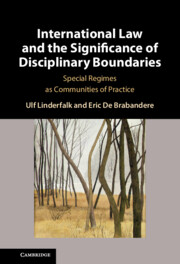 International Law and the Significance of Disciplinary Boundaries
International Law and the Significance of Disciplinary Boundaries Published online by Cambridge University Press: 21 November 2024
The ILC Study Group on Fragmentation of International Law asserted that the proliferation of special regimes poses a threat to the unity of the international legal system. Chapter 6 challenges this assumption. It builds on the distinction made in epistemology between knowledge-that and knowledge-how. The idea of a special regime as a community of practice makes it a system of knowledge-how. As such, it is compatible with all of the legal positivist’s, legal realist’s and legal idealist’s conceptions of an international legal system, which either see it as a system of knowledge-that or a combination of a system of knowledge-that and a system of knowledge-how. In the former case, in no way does the proliferation of special regimes affect the unity of the international legal system. In the latter case, the unity of the international legal system is indeed affected, but only in a positive sense, as it increases the efficacy of international law relative to the assumed legal ideal.
To save this book to your Kindle, first ensure [email protected] is added to your Approved Personal Document E-mail List under your Personal Document Settings on the Manage Your Content and Devices page of your Amazon account. Then enter the ‘name’ part of your Kindle email address below. Find out more about saving to your Kindle.
Note you can select to save to either the @free.kindle.com or @kindle.com variations. ‘@free.kindle.com’ emails are free but can only be saved to your device when it is connected to wi-fi. ‘@kindle.com’ emails can be delivered even when you are not connected to wi-fi, but note that service fees apply.
Find out more about the Kindle Personal Document Service.
To save content items to your account, please confirm that you agree to abide by our usage policies. If this is the first time you use this feature, you will be asked to authorise Cambridge Core to connect with your account. Find out more about saving content to Dropbox.
To save content items to your account, please confirm that you agree to abide by our usage policies. If this is the first time you use this feature, you will be asked to authorise Cambridge Core to connect with your account. Find out more about saving content to Google Drive.